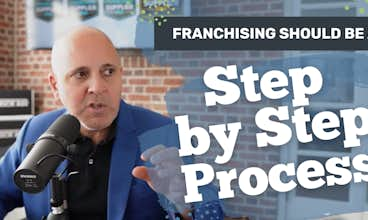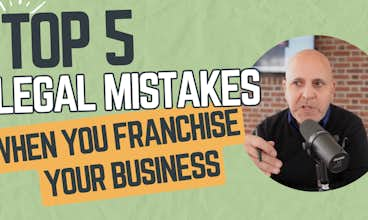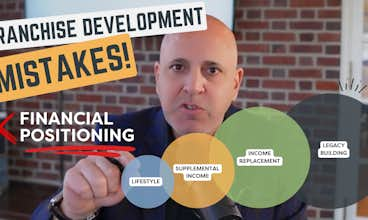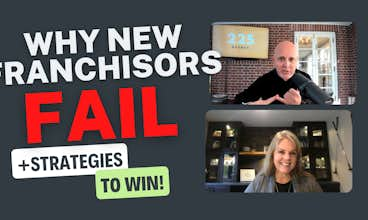Franchise Development Mistakes
Learn how to avoid these common franchising mistakes and keep your brand on the right track.
When you’re planning to franchise your business, knowing the mistakes to look out for as a new franchisor is critical.
From identifying the right time to franchise your business to mitigating future legal disputes,, there are important steps you’ll need to take when you’re getting started – and plenty of missteps to avoid. By taking the time to learn about the most common errors made by new and emerging franchisors during the development process, you can prevent future headaches and course-correct whenever mistakes are made.
In this guide, we’ll explore the five most common development mistakes new franchisors make when franchising their business and share strategies for keeping your brand on the road to success.
Top 5 Development Mistakes to Avoid When Franchising Your Business are:
- Choosing the wrong time to franchise your business
- Setting the wrong expectations as a franchisor
- FDD and legal compliance issues
- Franchising without proper capitalization
- Not building your franchise to win
1. Choosing the wrong time to franchise your business
Because franchising is a proven model that’s designed to scale, it can seem like the logical next step for successful entrepreneurs hoping to grow their brands. But franchising isn’t right for every business – and when it comes to franchising success, timing is everything.
As an aspiring franchisor, it’s important to determine if your business is ready to franchise before committing. To evaluate whether now is the right time to franchise, consider of the following questions:
How are your numbers? Do you have a strong track record of success as an entrepreneur? Is your business financially healthy and properly capitalized to support franchisees? If not, it might not be the right time to franchise.
Do you have a franchisor mindset? Being a franchisor is different from owning a business and requires a growth-based mindset. Are you willing to invest time, energy and money into growing your brand, learning the franchise industry, attending conferences, setting long-term goals and developing a five-year plan?
Is your business scalable? To successfully franchise, your business model must be replicable. This means registering and protecting your trademarks and developing systems and processes that can be reproduced across multiple franchise locations.
Do your goals align with franchising? Becoming a franchisor isn’t just about making money. It’s also about growth, supporting franchisees and creating a win-win situation for everyone involved with your brand.
If you aren’t ready to franchise your business yet, don’t give up. After improving your numbers, establishing replicable systems and processes, and re-evaluating your goals, you can revisit franchising in the future.
2. Setting the wrong expectations as a franchisor
Having the right expectations – and utilizing the right strategies – is key to franchising success. Unfortunately, “one-stop shop” franchise development companies sometimes treat franchising as the result of getting paid for a cookie-cutter process.
But when you’re launching a new franchise system, simply creating a generic website and marketing materials and having your Franchise Disclosure Document (FDD) issued isn’t the end of the franchise development process – it’s the beginning of your journey as a franchisor. Because scaling your business will require years of effort, it’s important to avoid setting the wrong expectations once your FDD is issued.
To stay realistic about franchising, keep the following points in mind:
Have a five-year plan. Franchising success doesn’t happen overnight. Instead, it requires setting long-term goals and achieving them over at least five years. To plan for success, create a five-year success plan that allows you to season, grow and scale your business over time.
Competitively position your offering. From your franchise website to your founder’s story, your marketing materials should tell a compelling story about your brand. The disclosures in your FDD – including your Item 19 financial performance representations – should also entice prospective buyers to invest in your company.
Don’t expect instant growth. Being realistic about the timing and steps to success is critical as a franchisor. Scaling typically comes later, after you’ve spent several years seasoning your brand organically and over-supporting your first few franchisees.
By adopting a growth mindset and keeping your expectations realistic as a new franchisor, you’ll be able to meet your brand where it is and scale it sustainably over time.
3. FDD and legal compliance issues
The franchise industry is heavily regulated by federal and state franchise laws. Because legal and compliance mistakes can incur costly fines and penalties – and, in some cases, lead to litigation or disputes with franchisees – building a rock-solid FDD and legal foundation for your brand as early as possible is necessary.
Although some “one-stop-shop” franchise development companies offer all-in-one packages that include legal services like FDD development or document preparation, those services aren’t always what they seem. Sometimes, unreputable developers will use boilerplate legal documents and approach compliance with a “one-size-fits-all” mentality that can leave you exposed to legal liability.
The risks of working with unreputable franchise developers when franchising your business can include, but aren’t limited to, the following:
A lack of legitimate legal representation
Bad territory structures
A poorly drafted FDD and missed sales opportunities
Failure to comply with federal and/or state-specific laws
Legal errors that could leave your business exposed to liability
As a new franchisor, working with a licensed attorney to build your franchise system’s legal foundation can minimize liability risks and prevent expensive legal and compliance issues in the future.
4. Franchising without proper capitalization
Often, unreputable franchise developers will focus on the up-front costs of starting a franchise without encouraging new franchisors to consider how much capital they need to continue operating long term – a mistake that can lead to stalled growth and business failures.
As a new franchisor, make sure you have enough capital to support your franchise system long-term. This means setting enough money aside to launch your franchise system, fund marketing and sales efforts, and support franchisees in their success.
When evaluating your available capital, consider the following:
Do you have enough capital to support your corporate team? As a new franchisor, you’ll need to be able to hire and maintain the right people to grow your business.
Can you afford to launch your brand? Do you have enough capital to pay for marketing, website development, advertising and other necessary expenses?
Can you support franchisees? Do you have enough funds to cover the costs of onboarding, training, opening and supporting franchisees’ businesses?
What are your goals? When developing your five-year plan, remember that your goals should be realistic and tied to the amount of capital you will have available long-term.
By aligning your goals and strategies with your available capital, you can ensure a smoother development process that will allow you to grow organically while gaining traction as a startup franchisor.
5. Not building your franchise to win
To achieve success as a franchisor, your franchise system must be built to win. Usually, this requires working with the right people to build a quality brand. Because of that, it’s important to avoid working with unreputable franchise development companies that take a “one-size-fits-all” approach to franchising.
Instead, make sure your brand is strategically positioned according to its needs. Some winning strategies for franchising success include, but aren’t limited to:
Differentiate your brand. Your trademarks, website, founder’s story, marketing, sales materials, and level of franchisee support should set you apart from competitors and make your brand’s value clear.
Have a sturdy legal foundation. By working with a seasoned franchise attorney, you can reduce your company’s exposure to legal risks and ensure compliance with federal and state regulations.
Develop a competitive FDD. Your FDD is about more than just compliance – it’s about telling a compelling story about your brand. A well-written, competitively positioned FDD can be a valuable tool for boosting franchise sales.
Adopt the right mindset. The best franchisors begin with the end in mind, adopt a growth-oriented mindset and are willing to commit themselves to seasoning and growing their brand over time.
Set realistic expectations. In the franchising industry, success requires consistent long-term effort. Expect to scale your business – but not overnight.
As a startup franchisor, knowing which development mistakes to avoid when franchising your business can put you on the path to success early in your career. It can also shield your brand from legal exposure and provide validation from satisfied franchisees as your brand matures – an asset that’s worth its weight in gold for entrepreneurs looking to scale.








